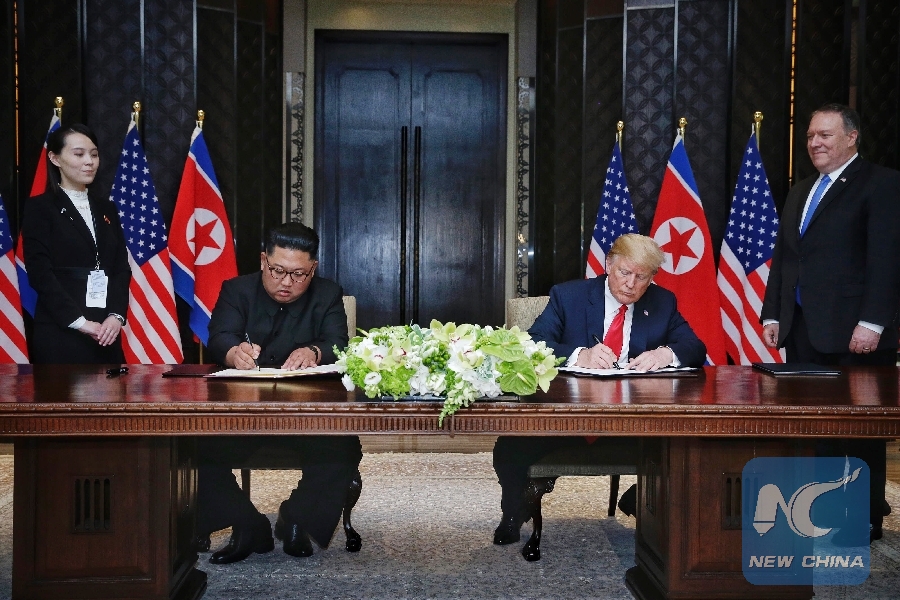
File Photo: Top leader of the Democratic People's Republic of Korea (DPRK) Kim Jong Un (2nd L) and U.S. President Donald Trump (2nd R) sign a joint statement in Singapore on June 12, 2018. (Xinhua/Ministry of Communication and Information of Singapore)
by Xinhua writer Zhu Dongyang
BEIJING, Aug. 30 (Xinhua) -- U.S. President Donald Trump on Wednesday renewed his assertion that China shall be blamed -- at least partly -- for the current logjam of Washington-Pyongyang talks.
Trump tweeted that he "feels strongly" that the Democratic People's Republic of Korea (DPRK) is under "tremendous" pressure from China. Accusing Beijing of providing considerable aid to Pyongyang, he also threatened to "instantly start the joint exercises again" with South Korea and Japan that "will be far bigger than ever before."
It was not the first time that Trump made such a statement, and may not be his last time either. A breakthrough in talks with the DPRK, which was supposed to be his diplomatic "jewelry on the crown," would be a major boost for the mid-term elections; anything otherwise will be seen as a blow to the deeply troubled White House.
In fact, Washington's provocations and military threats never came to a stop even around the Singapore summit. Hostility between Washington and Pyongyang remains barely surmountable.
The U.S. share of blame was considerable, given its reluctance to offer any substantial commitment to the DPRK's security, its insatiable request for the DPRK to denuclearize within a year, and its exaggeration of results of the Singapore summit, making it hard for the U.S. team to accept any lesser concessions.
Meanwhile, "verifiability" and "irreversibility" have been Washington's favorite words when it comes to the DPRK's denuclearization. Yet, such standards demand two-way efforts.
The Pentagon's saying that it has no plan as to whether to continue suspending major U.S.-South Korea drills in the next year is a setback from its previous promise of an "indefinite" suspension.
U.S. media also reported on Wednesday that Trump told Kim Jong Un, the DPRK's top leader, that he would sign a war-ending declaration with the DPRK soon after the Singapore summit, yet he has failed to do so.
Instead, Washington "has repeatedly asked Pyongyang to dismantle most of its nuclear arsenal first, before signing such a document," irritating the DPRK and casting doubt on the United States' own credibility.
The U.S. accusation of China's aid to the DPRK is also untenable, contradicting the widely recognized fact that China has strictly abided by the UN Security Council resolutions.
It is advisable that Washington understand the full implication and purposes of these resolutions that highlight both sanctions and conversations, and strive for an ultimate denuclearization through dialogue rather than maximum pressure.
The U.S. deliberate distortion of the UN resolutions, reluctance to pay the due price for its security, and ignoring China's decades of peace-making endeavors would obstruct the political settlement of the Peninsular issues.
Instead of repeating the rhetoric and levying pressure, it is high time for the current U.S. administration to reconsider its DPRK policy and change its course toward a constructive direction.
Patience and perspective can never be over-emphasized for a complex geopolitical issue like the Korean Peninsula. Many options to solve it remain open to discussion, yet attempts to get everything with nothing or even to pull the chestnuts out of the fire shall never be included.
Now the ball is in Washington's court, not China's.

